The Department of Anthropology’s field school courses have provided CSU students with the opportunity to apply what they have learned in the classroom to a field setting. Students have the opportunity to participate in one of the three field schools offered by the department: the Archaeology Field School, Paleontology Field School, and Ethnographic Field School.
For 50 summers, the Archaeology Field School has offered hands-on training in a variety of archaeological field methods and provided exposure to many types of Colorado sites. Based out of Greybull, WY, the Paleontology Field School teaches students how to identify fossils of the first true primates, prospect for new fossil-bearing localities, map sections, and collect vertebrate fossils from the earliest Eocene beds in the Bighorn Basin. Professor Katherine Browne will be taking over the Ethnographic Field School in 2019, previously directed by Emerita Professor and Chair Kathleen Pickering. This field school will train students in ethnographic methods and they will work with communities that have experienced disasters.
For many students, participating in the field schools often means forgoing a summer job, creating financial hardship. In 2017, the Department of Anthropology sought to change this, establishing the Anthropology Field School Scholarship. After a successful crowdfunding campaign in the summer of 2017 that raised more than $5,000 from generous alumni and friends, the Anthropology Field School Scholarship funded five students to participate in the 2018 programs with a reduced financial burden.
These students returned from field school and reflected on how the course, and the scholarship, made a real difference on their CSU experience.
For Allyson Fyfe, junior biological anthropology and electronic art double major, the Paleontology Field School solidified her decision to study anthropology and to make it part of her future career:
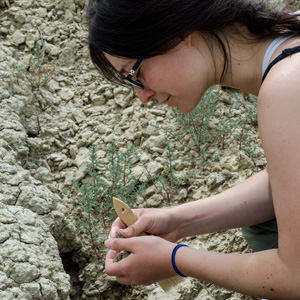
“I had an ‘aha’ moment during this field school. Up to this point, being in the Department of Anthropology has just felt right – like I am in the right place. Participating in research both in the field and in the lab was a sigh of relief as if to say, ‘yeah, this is what college is about and this is the kind of stuff you want to be a part of.’ When you are surrounded by people who are as interested in the things you are for two weeks, you get the feeling you’re probably in the right spot. The most meaningful part of this course for me has been the fieldwork. Seeing and participating in the fossil collection process was eye opening and revealed the importance of geology to me. In the lab, you see numbers and specimens, but seeing where they came from is amazing.”
Students prospect for fossils, making discoveries that have a real impact on understanding the evolution of primates and the field of paleontology as well as biological anthropology. Sammi Lauth, junior cultural anthropology and human dimensions of natural resources double major, shares the importance of their work, as well as how the experience enhanced the lessons she learned in the classroom:
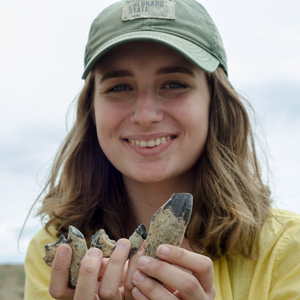
“Since the Bighorn Basin, located just outside the little town of Greybull, Wyoming, preserves such a rich and diverse fossil record, it gives us paleontologists a look into an ancient subtropical environment where extinct species of tapirs and crocodiles roamed; large, flightless birds stalked cocker spaniel-sized horses; and where early prosimians strengthened their foothold, eventually giving way to modern day primates. The research the Paleontology Field School crew does is so important for understanding mammalian and primate origins, and the data we collect belongs to the Denver Museum of Nature and Science.
After a few days, I found myself identifying species in the field, their names rolling off my tongue, whereas, in the lab a week earlier, I mixed up the taxa with one another. Working in the field solidified the information I had in a way that sitting in a classroom sometimes doesn’t.”
Lacey Sapp, senior sociology and biological anthropology double major, enjoyed the daily excitement of being outside and finding fossils during her summer in the Paleontology Field School:
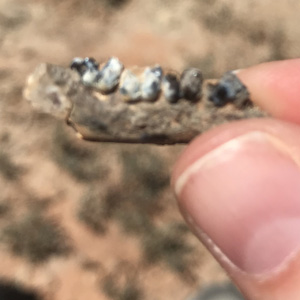
“Field school was a completely new experience for me. I enjoyed being out in nature and spending the days in the sun. Searching for fossils was incredibly rewarding. Some days, I would search for an hour or two without finding anything of importance, but other days, I was able to find quite a few fossils in a short period of time. Although the weather was unpredictable, our field crew was able to find over 600 fossils this season. The most important part of the field school was knowing that the specimens I collected in the field would be cataloged in the Denver Museum of Nature and Science. Even though some of the specimens we found were no bigger than a thumb tack, they have an incredible amount of scientific value.”
For Alaura Hopper, a junior anthropology major, her experience in the Archaeology Field School provided skills that would prepare her for a career in anthropology and beyond:
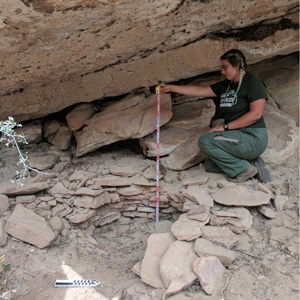
“This entire course was full of skills that I can take with me to my career. If my career path leads me to be a Field Archaeologist, I can take all the technical skills I have learned with me including using field technologies, identifying artifacts and eco-facts, keeping a field journal, photography, excavation skills, mapping skills, and so much more. For any other career I might encounter, I will certainly take my leadership skills, my intuitive skills, attention to detail and time management skills that I have harbored. This Field School helped me to be a dedicated worker and a humbled student. I took on tasks that seemed a little scary and overwhelming and learned to manage them efficiently until I was proficient in them.”
Beyond the skills learned and the passion for anthropology ignited, Amber Czubernat, an anthropology major, found that the most meaningful part of her Archeology Field School experience was about the community of scholars and friends that she established throughout the course:
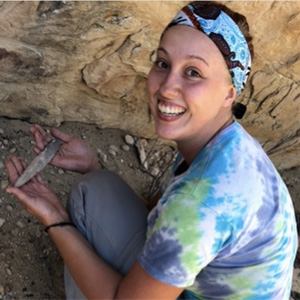
“I feel that the most meaningful part of this course has been working with and making connections with people that are just as passionate about anthropology and archaeology as I am. My crew made this experience even better, due to their willingness to work hard together and participate in research that is important. Dr. LaBelle also contributed so much to making this experience meaningful to me, due to his passion in the field and desire to ensure the success of his students. It did not feel like work to me, despite the eight hours of hard labor in the hot sun five days a week, because we all enjoyed what we were doing and all got so much more than we were expecting from this experience as a collective.”
CSU anthropology field schools provide hands-on experiences for students that classrooms cannot provide and offer a skillset that is essential for their careers. “These experience help cultivate the knowledge and passion for young professionals like myself,” explains Lauth. “Thank you to everyone who made the Anthropology Field School Scholarship possible and for giving me this opportunity that I would not otherwise have had.”
Fyfe adds, “with college being expensive enough as is, the Anthropology Field School Scholarship made this experience an opportunity that I could participate in.”
This summer, alumni and friends came together again, raising even more support for student scholarships thanks to Jeff Eighmy, professor emeritus and chair of the Department of Anthropology, and his wife, Catherine, who pledged to match all gifts up to $2,500. Through the power of collective giving, more than $7,700 was raised for the Anthropology Field School Scholarship, providing this meaningful learning opportunity for students in next summer’s Anthropology Field Schools.
You can still support next year’s students through the Anthropology Field School Scholarship by making a gift online at https://advancing.colostate.edu/ANTHROPOLOGY.